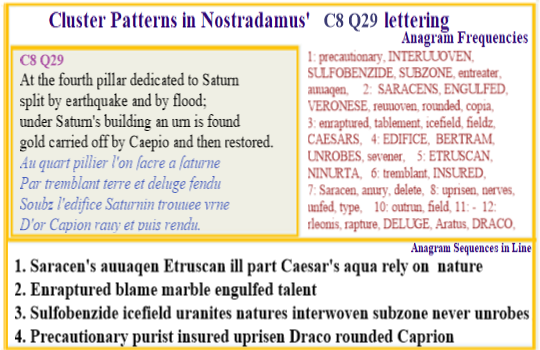 Analyses of all verses
Analyses of all verses
|
 Web Site
Web Site |
 All
Sefirots All
Sefirots |
Nostradamus C8 Q29: Caesar and Caepio as reference guides to modern gold crisis.
Copyright: Allan Webber, December 2015
 The intent of this verse is to provide a suitable metaphor for the gold
based financial crisis of the 21st century.
The intent of this verse is to provide a suitable metaphor for the gold
based financial crisis of the 21st century.
By comparison to events surrounding two ancient figures ( Caepio & Caesar) Nostradamus delivers a picture of the events that will identify the coming crisis.
Both the above ancients had adventures in the parts of Southern Europe with which Nostradamus was well acquainted, so their referencing is quite apt.
The following extract in Wikipedia provides detail of the gold carried off by Quintus Servilius Caepio in 105 BCE an event which is directly referred to in the last line of this verse.
While marching to Arausio (modern-day Orange) Caepio plundered the temples of the town of Tolosa, ancient Tolouse, finding over 50,000 fifteen-pound bars of gold and 10,000 fifteen-pound bars of silver. Strabo reports a story told in his time of this semi-legendary treasure, the aurum Tolosanum, supposed to have been the "cursed gold" looted during the sack of Delphi during the Gallic invasion of the Balkans in 279 BC. The riches of Tolosa were shipped back to Rome, but only the silver made it; the gold was stolen by a band of marauders, who were believed to have been hired by Caepio himself. The Gold of Tolosa was never found, and was said to have been passed all the way down to the last heir of the Servilii Caepiones, Marcus Junius Brutus.
The text holds the name Caepio while the anagrams contain ' Caesar's talent'.
Caesar followed Caepio by about two generations and one of the common recognitions by later generations was that he was a man of many talents. The following is a concluding statement in a brief online article on Caesar's life:
As a general and a statesman, Caesar has clearly earned his place in world history. With the exception of Cicero, he was the greatest orator of his time. As a historian, he has rarely been surpassed in simplicity, directness and dignity. A man of many talents, Caesar was a mathematician, philologist, jurist and architect. The main outcome of his illustrious career was the transformation of Rome from a Republic to an Empire.
Key Ideas:
precautionary, sulfobenzide, interwoven, subzone, entreater, awaken, uncorded, engulfed, rewoven, rounded, Saracens, Veronese, copia, enraptured, tablement, icefield, fieldz, Caesars, edifice, unrobes, Bertram, sevener, Etruscan, Ninurta, tremblant, insured, anury, delete, uprisen, nerves, unfed, type, Saturnin, outrun, field, rleonis, rapture, deluge, cordu, Aratus, Asatru, Draco, Caesar, zub, waken, quatr, lamb, rinsed, uranites, uranate, latent, rvnes, never, blame, marble, dud.